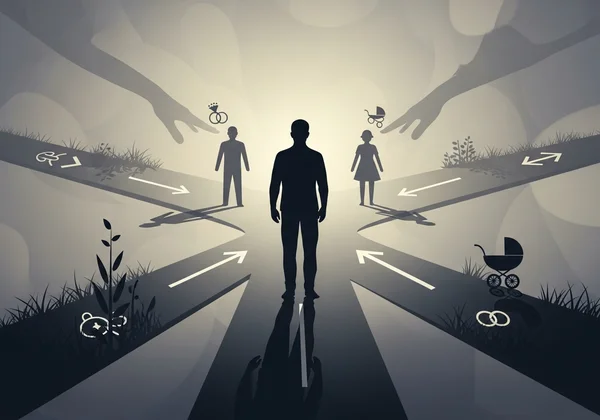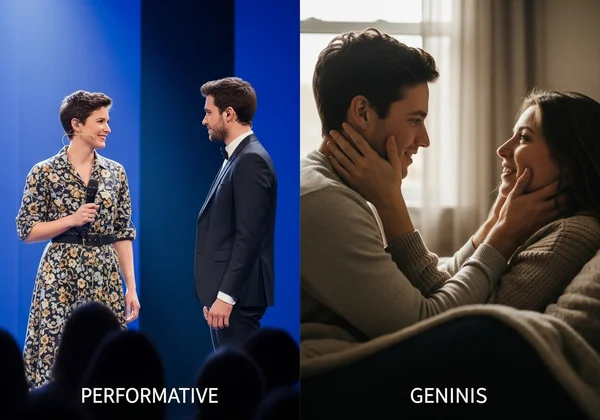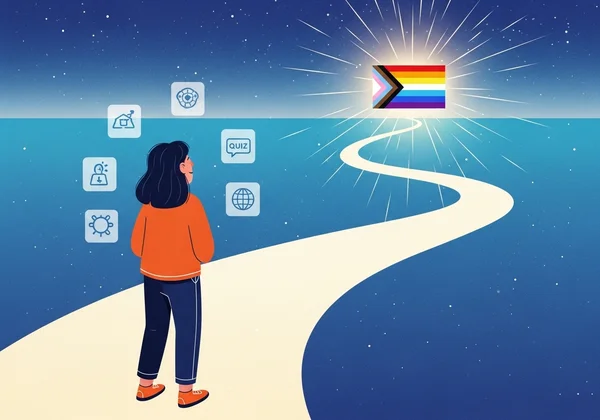Am I a Lesbian? Discover Your Sexual Orientation with Our LGBTQ+ Quiz
October 11, 2025 | By Riley Foster
Have you ever felt like you were just going through the motions in a relationship with a man? Or looked at your female friends and felt a connection that seems deeper than friendship? If you’re asking, Am I a lesbian?, you are not alone. Many women and AFAB (assigned female at birth) individuals grapple with these feelings, often due to a powerful, invisible force: "compulsory heterosexuality."
This guide will break down what "CompHet" is and how it might influence your perception of attraction. This is a safe space for reflection. If you're ready to understand yourself on a deeper level, our LGBTQ+ orientation quiz can help you explore your feelings.
What is Compulsory Heterosexuality (CompHet)?
Understanding CompHet is often the "aha!" moment for many who are questioning their sexuality. It’s a concept that provides language for a feeling you might have had your whole life but could never quite name. It’s not about blame; it’s about awareness.
The Origin and Meaning of CompHet
The term "compulsory heterosexuality" was coined by poet and theorist Adrienne Rich in 1980. At its core, it describes the pervasive societal assumption that heterosexuality is the default—the only 'normal' or 'natural' path for everyone. From fairy tales where the princess always marries a prince to questions from relatives about when you'll get a boyfriend, society constantly reinforces heterosexuality as the only acceptable path. This pressure is so deeply ingrained that we often internalize it without realizing it, leading us to perform heterosexuality to fit in, feel safe, or simply because we don't know another way is possible.

How Societal Expectations Shape Our Perceptions of Love and Attraction
Societal expectations act like a filter over our true feelings. We're taught that love should look a certain way—usually between a man and a woman—which causes confusion when our internal experiences don't match. You might have convinced yourself that comfort with a male partner was love, or that intense feelings for a female friend were just a "girl crush." CompHet makes it hard to trust our instincts because society tells us our attraction should only point one way. Untangling these messages is a crucial step in discovering your authentic self.

Am I Experiencing CompHet, or Am I Truly Attracted to Men?
This is the central question for many. It can be incredibly confusing to differentiate between a genuine attraction to men and one that has been performed out of obligation. The key is to look at the quality of your feelings, not just your actions.
Common Signs You Might Be Experiencing CompHet
Self-reflection can bring clarity. Consider if any of the following experiences resonate with you. These are not definitive proofs, but rather common patterns for those influenced by CompHet:
- You feel anxious or relieved when a crush on a man doesn't work out. Relief, instead of heavy disappointment, suggests you were invested in the idea of the relationship, not the person.
- Your attraction to men feels vague or purely aesthetic. You appreciate that a man is handsome but feel no genuine desire for romantic or physical intimacy.
- Your fantasies about men are passive, while fantasies about women feel active and personal. You might imagine scenarios where a man desires you, but you are a passive character. In contrast, your fantasies about women feel personal and exciting.
- Your relationships with men feel consistently draining. Relationships take work, but if they consistently feel like a chore or a performance, it's worth examining why.
- You’ve only ever developed feelings for men who were unavailable or uninterested. This can be a subconscious way to engage with heterosexuality without having to commit.
- The thought of being with a woman feels like a breath of fresh air. Imagining a romantic future with a woman brings feelings of peace, excitement, or "coming home"—a powerful indicator of your true desires.
If these points are making you think, an LGBTQ+ quiz can be a helpful, private way to continue this reflection.
Differentiating "Performative" Attraction from Genuine Desire
Performative attraction is rooted in seeking external validation—wanting to be seen as "normal." You might enjoy the attention a man gives you more than you enjoy the man himself. It's about playing a part.
Genuine desire is an internal, magnetic pull that doesn't care who is watching. It’s a craving for emotional, intellectual, and physical closeness that feels natural and energizing, not draining. Ask yourself: When you think about past attractions, were you driven by a desire for the person, or for the "normal" life they represented? The answer can reveal a lot.

Your Journey of Self-Discovery: Embracing Fluidity and Authentic Identity
Realizing CompHet has played a role in your life is a massive step. It can also bring up a mix of emotions—relief, anger, grief for lost time. Be gentle with yourself. This is not an ending but a beginning.
Navigating Feelings About Past Heterosexual Relationships
It's common to look back on past relationships with men and feel guilt or confusion, wondering if you were lying. Remember that you operated with the self-awareness you had at the time. Those relationships weren't "fake"; they were part of your story and taught you about yourself, including what you don't want. Acknowledge them with compassion and give yourself permission to move toward an authentic future.
Beyond Labels: How to Explore Your Attraction Authentically
The label "lesbian" might feel right, but it's okay if you're not ready for it, or if "bisexual" or "queer" fits better. The goal isn't to rush to a label, but to live authentically. Explore your attraction without pressure—consume queer media, follow lesbian creators, or simply let your daydreams wander. This journey is yours to define. There is no timeline. If you're looking for a structured way to start, you can find clarity here.

Empower Your Self-Discovery with Deeper Insights
Understanding compulsory heterosexuality is like getting new glasses—your past and present come into sharper focus. It empowers you to separate societal expectations from your genuine feelings, giving you the freedom to discover who you are. This journey is deeply personal, and having the right tools makes all the difference.
Your exploration doesn't have to stop here. If this article has resonated, consider it a sign you're ready for more. You can gain deeper, personalized insights by taking our gay test. The GayTest.me quiz is a free, confidential tool designed by LGBTQ+ individuals and psychology professionals to guide your self-reflection.
Frequently Asked Questions About Sexual Identity & CompHet
Is it normal to question my sexuality, especially later in life?
Absolutely. There's no age limit on self-discovery. Many people, particularly women, realize their true sexuality later in life as the pressures of CompHet lessen. It's a brave and normal part of the human experience to evolve into a more authentic version of yourself over time.
Can my sexual orientation change or evolve over time?
Yes, for many, sexuality is fluid. This isn't "confusion"; it's acknowledging that our self-understanding can deepen and shift with new experiences. Some people identify one way their whole lives, while others find their identity evolves. Both paths are valid.
How do I know if I'm a lesbian if I've only dated men?
Your relationship history doesn't define your orientation; your attraction does. Many lesbians have dated men due to CompHet before realizing their true feelings. Reflect on where your genuine emotional and romantic energy is drawn. If it consistently points toward women, that's what matters. A sexual orientation test can provide a helpful framework.
What should I do after realizing I might be experiencing CompHet?
First, just sit with this new awareness and allow yourself to feel. From there, you can seek out community by reading books, watching films, or following creators with similar experiences. The most important thing is to be patient and kind to yourself as you navigate this new understanding.
Where can I find more support for questioning my sexuality?
Finding support is key. Online communities, local LGBTQ+ centers, and affirming therapists are great resources. Additionally, exploring tools built for this can be a safe way to process your feelings. We invite you to start your journey on our platform, designed to be a supportive first step.